Natural Materials
Natural materials are substances that are found in nature and have not been significantly altered by human intervention. These materials are derived from the Earth's resources and can be used in their natural form or undergo minimal processing to be used for various purposes.
Types of Natural Materials
There are various types of natural materials, including:
- Wood: Derived from trees and used in construction, furniture making, paper production, and more.
- Stone: Includes materials like marble, granite, and slate, used in construction and sculpture.
- Clay: Used to make pottery, bricks, and ceramics.
- Metals: Such as iron, copper, and gold, used in manufacturing and construction.
- Natural Fibers: Such as cotton, wool, and silk, used in textiles and clothing.
- Leather: Made from animal hides and used for clothing, upholstery, and accessories.
- Natural Polymers: Includes materials like rubber and shellac.
Properties and Uses
Natural materials possess unique properties and are used for a wide range of purposes:
- Durability: Many natural materials, such as stone and metal, are known for their strength and longevity, making them ideal for construction and manufacturing.
- Renewability: Materials like wood and natural fibers are renewable resources, making them sustainable choices for various applications.
- Biodegradability: Some natural materials, such as cotton and wool, are biodegradable, reducing their environmental impact.
- Aesthetics: Natural materials are often valued for their natural beauty, making them popular choices for decor and artistic endeavors.
Study Guide
When studying natural materials, it's important to understand the following key concepts:
- Identify and describe different types of natural materials and their sources.
- Discuss the properties and characteristics of natural materials, including their uses and applications.
- Explain the environmental impact of using natural materials and compare them to synthetic alternatives.
- Explore the historical and cultural significance of natural materials in human societies.
- Examine the process of harvesting, processing, and utilizing natural materials in various industries.
By mastering these concepts, you'll develop a comprehensive understanding of natural materials and their significance in the world around us.
[Natural Materials] Related Worksheets and Study Guides:
.◂Biology Worksheets and Study Guides High School. Vertebrates II
Worksheet/Answer key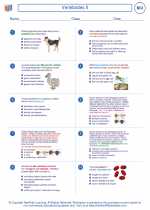 Vertebrates II
Vertebrates II  Worksheet/Answer key
Worksheet/Answer key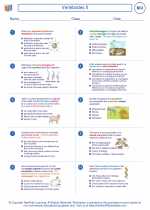 Vertebrates II
Vertebrates II  Worksheet/Answer key
Worksheet/Answer key Vertebrates II
Vertebrates II  Vocabulary/Answer key
Vocabulary/Answer key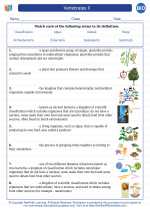 Vertebrates II
Vertebrates II  Vocabulary/Answer key
Vocabulary/Answer key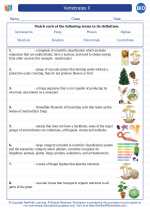 Vertebrates II
Vertebrates II  Vocabulary/Answer key
Vocabulary/Answer key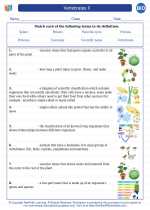 Vertebrates II
Vertebrates II 

 Worksheet/Answer key
Worksheet/Answer key
 Worksheet/Answer key
Worksheet/Answer key
 Vocabulary/Answer key
Vocabulary/Answer key
 Vocabulary/Answer key
Vocabulary/Answer key
 Vocabulary/Answer key
Vocabulary/Answer key

The resources above cover the following skills:
LIFE SCIENCE (NGSS)
Ecosystems: Interactions, Energy, and Dynamics
Students who demonstrate understanding can:
Use mathematical representations to support and revise explanations based on evidence about factors affecting biodiversity and populations in ecosystems of different scales.